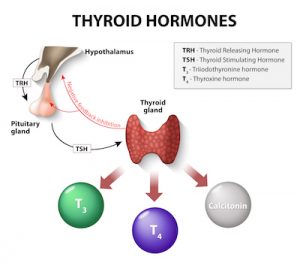The thyroid.

One of the more confusing glands I felt to understand when I was going through schooling for naturopathy; it is small but mighty, and when it’s not working properly, many things are not in their proper balance.
I am going to describe briefly how the thyroid is supposed to function, and some simple tests we have started using to find out if it is working. Please be aware that I will be mentioning vitamins that the thyroid uses for proper functioning, but I would recommend that if you are not seeing a health professional to identify these deficiencies not to rush out and purchase anything. The thyroid is complex, and healing it takes some time and wisdom! This is to help you understand your thyroid better. This post will be about hypothyroidism, or when the thyroid under-functions. The basic activity of the thyroid is the same however even for other thyroid conditions.
The thyroid gets its instructions and marching orders from the hypothalamus and pituitary, two centres in the brain that decide upon its activity. TRH, thyroid releasing hormone, and TSH thyroid stimulating hormone. TRH from the hypothalamus tells the pituitary to release TSH so that more thyroid hormone is created, and the thyroid itself gets to work making T4.
In order to become active thyroid hormone, the chemical T4 must be converted to the active constituent T3. This requires an enzyme thyroperoxidase and the presence of selenium, zinc, and iodine. This is a simplistic discussion, as there are further complexities, but in a nutshell, that’s what is required.
There are a few places this conversion can go wonky:
- We don’t have the cofactors (zinc, selenium, iodine)
- The enzyme thyroperoxidase is not working properly
- We don’t have enough T4 to make T3
- The body makes antibodies against the thyroid – seen in immune dysfunction like infection – like anti-thyroperoxidase antibody and anti-thyroglobulin
- T4 is made into an inactive form of T3 called reverse T3, that floats around and looks like T3 but isn’t active
Why does this make a difference to you?
The thyroid has many responsibilities – metabolism (weight gain and loss), fluid movement, growth, and if it is struggling to get active T3, you will feel many effects including:
- depression
- weight gain
- water retention
- exhaustion
- dry skin
- constipation
- elevated cholesterol
- feeling cold all the time
- hair that is falling out
- swelling of the thyroid gland (goiter)
- feeling difficulty swallowing or a pressure in the throat
What I’m describing above is more associated with hypothyroidism; the thyroid is under-functioning. The TSH (thyroid-stimulating hormone) will increase to try to get more T4 produced to produce more T3, and yet nothing happens.
What is also known to occur is the body temperature will start to decrease. This is well-documented in what is known as Wilson’s Temperature Syndrome; low body temperature will indicate that the thyroid needs help and needs to be supported.
5 things to do to help your thyroid
- Test your body temperature. For more information here see Dr. Wilson’s font of information, but in a nutshell, if it’s below 98.3 consistently (normal is 98.5) the thyroid is having trouble (even if your test numbers are normal).
- Test all of your thyroid with your doctor – this means TSH, T4, T3, reverse T3 and anti-thyroid antibodies
- Please note: Anything over a TSH of 2.5 can be considered hypothyroidism, despite clinical guidelines stating that TSH is considered “normal” under 5. Many people feel symptoms of hypothyroidism well below 5, so it’s an important discussion to have with your doctor if you are in this category.
- Eat food with iodine (but not too much)
- Eat foods with zinc
- Eat foods with selenium
If in testing your body temperature and your thyroid functioning, you will need to make a decision with your doctor
- Take a T4-derivative medication (giving the body more T4 availability can help it to make more T3)
- Get T3 support directly
- Take supportive herbs that also increase the availability of T4/T3
- Increase the cofactors (zinc, selenium, iodine) with hopes that the T3 will be actively utilized
Depending on the person, sometimes all that is needed is a very good dose of nutrients to help the thyroid get back to normal functioning. However, if you are exhausted and your TSH is very high (10+) then we know the thyroid is really struggling and medication can be necessary to get it back on track. Sometimes the medication is required for a long time or indefinitely, sometimes it is just a few weeks to months.
Make sure to ask many questions. This is a very simplistic breakdown of hypothyroidism and there are other syndromes that exist that mimic low thyroid functioning.